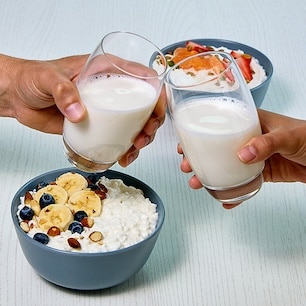
Published June 1, 2025
Dairy can provide some pretty important nutrients to support bodily functions. With a lot of focus on protein to feel full, lose weight, or build muscle, protein has gotten most of the attention. But plenty of other nutrients in dairy provide necessary functional benefits. Let’s dive in and learn more about this important food group.
Gut health support.
Some dairy contains probiotics* and certain vitamins and minerals that support your immune system. These probiotics have also been linked to skin health, cholesterol levels, and weight management.1 You can find them in yogurt, kefir, and select cheeses and cottage cheese.
| Greek yogurt | Kefir | Select cottage cheese and cheeses | |
| Common strands of live and active cultures | Bifidobacteria and lactobacillus | Lactobacillus kefiri | Lactobacillus paracasei |
*Each strain has its own unique benefits, so choosing the right one depends on your specific health needs.2
Bone health support.
Dairy contains calcium, phosphorus, and magnesium. Certain dairy-based milks and milk alternatives are commonly fortified with vitamin D, which works with other nutrients and vitamins to keep your bones strong.
| 2% milk, 1 cup (fortified with vitamin D) | Plain, low-fat yogurt, 6 oz | 2% cottage cheese, 4 oz | |
| Calcium | 293 mg (excellent source) | 311 mg (excellent source) | 125 mg (good source) |
| Phosphorus | 224 mg (good source) | 245 mg (excellent source) | 170 mg (good source) |
| Vitamin D | 120 IU (good source) | 1.7 IU | 0 |
| Magnesium | 27 mg | 29 mg | 10.2 mg |
Protein.
This macronutrient does more than help your muscles grow. Proteins are building blocks to cells, organs, bones, teeth, immune system, hair, nails, and more. Some forms of dairy are higher in protein than others.
| Milk/kefir, 1 cup | Greek yogurt, 1 cup | Cottage cheese, 1 cup |
| 8–9 g | 17–21 g | 25 g |
Daily recommendations.
USDA dietary guidelines recommend 2 to 3 servings of dairy per day. One serving is equivalent to 1 cup of milk, 1½ slices of cheese, 1 cup of yogurt, or 2 cups of cottage cheese.3
This recommendation is influenced by the daily recommended intake (DRI) of calcium of 1,000–1,300 mg/day.4 This range is dependent on age. Since dairy tends to provide more calcium per serving in comparison to other foods, adding dairy and other calcium-rich food sources to your daily intake can assist in reaching your DRI.
If you can’t tolerate dairy or you prefer dairy alternatives, that’s okay! They may not give you all the nutrients of traditional dairy, but alternatives such as almond, soy, and oat milks are fortified with some of these nutrients.
We are here to help! If you have additional questions on dairy—like “What are some good high-protein dairy options?”—please feel free to email our team of dietitians. Or check out this article, "To Dairy or Not to Dairy," about plant-based nondairy options!
For the love of you.
Choosing how you eat is uniquely personal. It’s about your needs, your preferences, and your goals. As your wellness ally, we’re in your corner with fresh ideas, recipes, and wellness icons that make it easier to shift toward wiser food choices. It’s all about you, at your very best.
Sources
1Probiotics: Usefulness and Safety. National Center for Complementary and Integrative Health. August 2019.
2Farahmand, Nasim, Labia I I Ouoba, Shahram Naghizadeh Raeisi, Jane Sutherland, and Hamid B. Ghoddusi. Probiotic Lactobacilli in Fermented Dairy Products: Selective Detection, Enumeration, and Identification Scheme. National Library of Medicine. July 27, 2021.
3U.S. Department of Agriculture. What foods are included in the Dairy Group? MyPlate.gov. Accessed February 4, 2025.
4Calcium. National Institutes of Health. July 24, 2024

 You are about to leave publix.com and enter the Instacart site that they operate and control. Publix’s delivery and curbside pickup item prices are higher than item prices in physical store locations. Prices are based on data collected in store and are subject to delays and errors. Fees, tips & taxes may apply. Subject to terms & availability. Publix Liquors orders cannot be combined with grocery delivery. Drink Responsibly. Be 21. For prescription delivery, log in to your pharmacy account by using the Publix Pharmacy app or visiting
You are about to leave publix.com and enter the Instacart site that they operate and control. Publix’s delivery and curbside pickup item prices are higher than item prices in physical store locations. Prices are based on data collected in store and are subject to delays and errors. Fees, tips & taxes may apply. Subject to terms & availability. Publix Liquors orders cannot be combined with grocery delivery. Drink Responsibly. Be 21. For prescription delivery, log in to your pharmacy account by using the Publix Pharmacy app or visiting